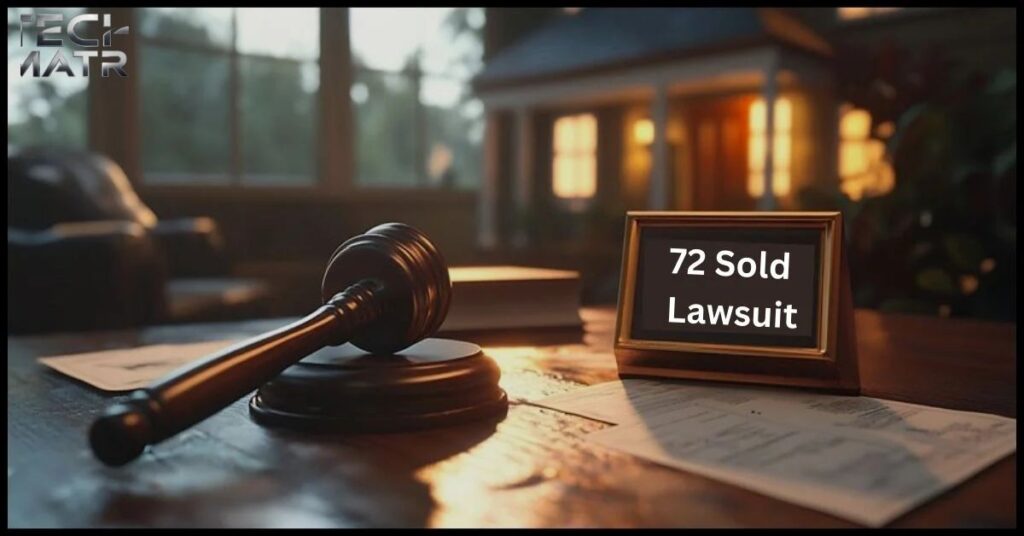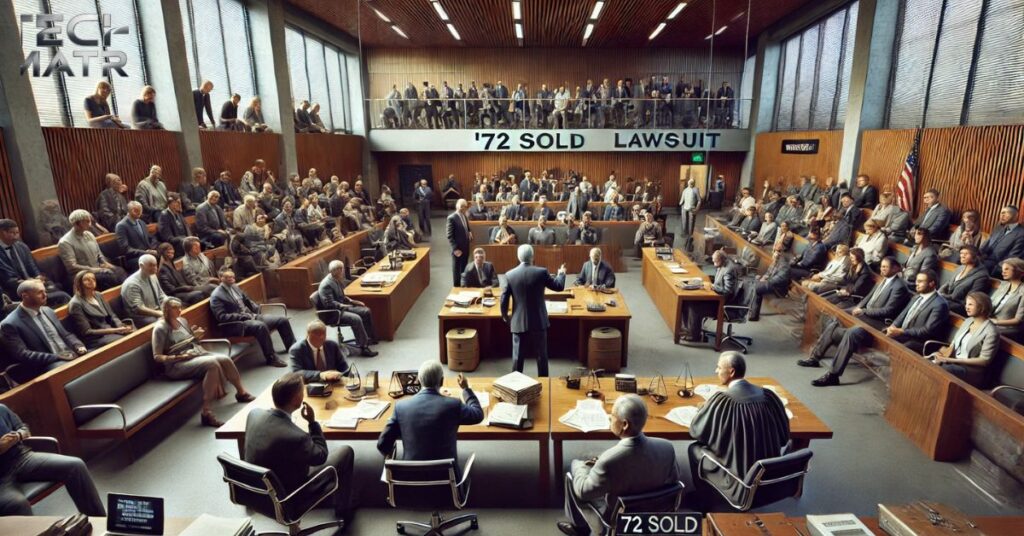The 72 Sold lawsuit refers to legal action taken against a real estate company accused of misleading practices. It highlights potential risks for home sellers and buyers when dealing with non-traditional real estate services.
Dreaming of a quick home sale? The 72 Sold lawsuit might make you think twice. Learn how this legal battle could impact your next real estate transaction, whether you’re buying or selling.
The 72 Sold lawsuit has raised concerns about fast-sale real estate practices and their impact on both sellers and buyers. This legal action highlights potential pitfalls in non-traditional home selling methods, prompting a closer look at consumer protections in the real estate market.
What is the 72 Hour Clause?

The 72 Hour Clause, also known as the “kick-out clause,” is a common provision in real estate contracts. It allows sellers to continue marketing their property even after accepting an offer. This clause gives the seller the right to accept a better offer within 72 hours.
The clause is designed to protect sellers from losing out on potentially better offers. It’s particularly useful in competitive markets where multiple offers are common. However, it can create uncertainty for buyers who may lose a property they thought they had secured.
How Does the Clause Affect Home Sellers?
For home sellers, the 72 Hour Clause provides flexibility and potential advantages. It allows them to accept an offer while still keeping their options open. This can be particularly beneficial in a rising market.
Sellers can use this clause to leverage better offers. If a higher bid comes in, they can use it to negotiate with the original buyer. However, sellers must be careful not to misuse this clause, as it could lead to legal complications.
How Does the Clause Affect Home Buyers?
For home buyers, the 72 Hour Clause can create anxiety and uncertainty. They may think they’ve secured a property, only to lose it to a higher bidder. This can be particularly frustrating in competitive markets.
Buyers faced with this clause have a few options. They can try to remove the contingency by offering a higher price or better terms. Alternatively, they can start looking for other properties as a backup plan.
The clause can also put pressure on buyers to act quickly. They may need to expedite their home inspection or mortgage approval process to secure the property before the 72-hour window closes.
Legal Implications and Potential Consequences
The 72 Hour Clause, while legal, can lead to complications if not handled properly. Both buyers and sellers need to understand their rights and obligations under this clause. Misuse or misunderstanding of the clause can lead to legal disputes.
For sellers, failing to properly notify the original buyer of a new offer within the 72-hour window could result in breach of contract. This could lead to lawsuits and potential financial penalties.
Buyers who lose a property due to this clause may feel wronged, but they generally have little legal recourse if the clause was properly executed. However, if they can prove the seller acted in bad faith, they might have grounds for a lawsuit.
Tips for Protecting Yourself in a 72 Sold Transaction
- Understand the terms: Make sure you fully comprehend the 72 Hour Clause before signing any agreement.
- Get everything in writing: Ensure all communications regarding the clause are documented.
- Act quickly: If you’re a buyer, be prepared to act fast if the seller invokes the clause.
- Consult a lawyer: Consider having a real estate attorney review your contract, especially in high-stakes transactions.
- Be transparent: Sellers should be upfront about their intentions to continue marketing the property.
Background on 72 Sold
72 Sold is a real estate company that promises to sell homes within 72 hours at above-market prices. The company gained popularity for its innovative approach to home selling. They use a combination of marketing techniques and the 72 Hour Clause to create urgency among buyers.
The company’s model involves heavily marketing a property for a short period, typically 72 hours. They claim this creates a competitive bidding environment, potentially driving up the sale price.
72 Sold’s approach has been both praised and criticized within the real estate industry. Supporters argue it maximizes value for sellers, while critics question its long-term sustainability and potential for manipulation.
The Allegations Against 72 Sold

The lawsuit against 72 Sold alleges that the company engaged in deceptive practices. Plaintiffs claim that 72 Sold artificially inflated home prices and misled both buyers and sellers about the true market value of properties.
Specific allegations include:
- Creating false urgency through manipulative marketing tactics
- Misrepresenting the number of offers on properties
- Failing to disclose important information to buyers and sellers
The lawsuit also questions the company’s use of the 72 Hour Clause, suggesting it was used to manipulate rather than facilitate fair transactions.
Home Sellers and Buyers Legal Analysis
From a legal perspective, the case against 72 Sold hinges on whether their practices constitute fraud or deceptive business practices. The key question is whether 72 Sold knowingly misled clients or if their practices fall within acceptable industry norms.
The use of the 72 Hour Clause itself is not illegal. However, if 72 Sold misused this clause or misrepresented its implications to clients, they could be found liable. The court will likely examine whether 72 Sold’s practices align with state and federal real estate laws.
The outcome of this lawsuit could have significant implications for how the 72 Hour Clause is used in real estate transactions. It may lead to stricter regulations or guidelines for its implementation.
READ THS BLOG: ImgSed:A New Era Of Image Manipulation
Impact on 72 Sold Laws

The lawsuit against 72 Sold could potentially lead to changes in real estate laws and regulations. If the allegations are proven, it might result in more stringent oversight of companies using similar business models.
Legislators might consider implementing new rules governing the use of the 72 Hour Clause. This could include requirements for clearer disclosures to both buyers and sellers about the implications of the clause.
The case could also spark discussions about the ethics of creating artificial urgency in real estate transactions. This might lead to new guidelines or best practices within the industry.
Industry-Wide Implications of the 72 Sold Lawsuit
The outcome of this lawsuit could have far-reaching effects on the real estate industry. It may force companies to reevaluate their marketing strategies and sales tactics. There could be a shift towards more transparency in transactions.
Real estate agents and brokers may need to be more cautious about how they create urgency in sales. This could lead to changes in how properties are marketed and how offers are solicited and managed.
The lawsuit might also impact consumer trust in innovative real estate models. Companies offering non-traditional services may face increased scrutiny from both consumers and regulators.
What’s Next for Real Estate?
Regardless of the lawsuit’s outcome, the real estate industry is likely to see changes. There may be a move towards more transparent pricing models and clearer communication about sales tactics.
Technology will continue to play a significant role in real estate transactions. However, there may be more emphasis on using tech to enhance transparency rather than to create artificial urgency.
Consumer education about real estate practices, including the use of clauses like the 72 Hour Clause, may become more prevalent. This could lead to more informed buyers and sellers in the market.
Other Notable Real Estate Lawsuits
The 72 Sold lawsuit is not the first to challenge real estate practices. Other notable cases include:
- Lawsuits against Zillow for their “Zestimate” home valuation tool
- Class action suits against major brokerages for alleged antitrust violations
- Cases challenging the legality of pocket listings
These cases have often led to changes in industry practices and regulations. They highlight the ongoing tension between innovation in real estate and consumer protection.
ALSO READ THIS BLOG: Muppet with Long Hooked Beak: History and Behind-the-Scenes Insights

For consumers, the lawsuit serves as a reminder to be cautious and well-informed when engaging in real estate transactions. It underscores the importance of understanding all clauses in a contract, including the 72 Hour Clause.
Buyers and sellers may become more skeptical of companies promising quick sales or above-market prices. This could lead to more due diligence on the part of consumers before engaging with real estate services.
The case might also encourage consumers to seek independent advice, such as from real estate attorneys, before entering into complex transactions.
Frequently Asked Questions
What is 72 Sold?
72 Sold is a real estate company that claims to sell homes within 72 hours at above-market prices using unique marketing strategies.
What are the main allegations in the lawsuit against 72 Sold?
The lawsuit alleges that 72 Sold engaged in deceptive practices, artificially inflated home prices, and misled clients about property values.
How does the 72 Hour Clause work?
The 72 Hour Clause allows sellers to continue marketing their property for 72 hours after accepting an offer, giving them the option to accept a better offer if one comes in.
What should I do if I’m buying or selling a home with a 72 Hour Clause?
Understand the clause fully, get everything in writing, and consider consulting a real estate attorney.
How might this lawsuit affect the real estate industry?
It could lead to changes in how properties are marketed, stricter regulations on sales tactics, and a greater emphasis on transparency in transactions.
Conclusion
The 72 Sold lawsuit highlights the complex legal and ethical issues surrounding modern real estate practices. It underscores the tension between innovative sales strategies and consumer protection. The case has the potential to significantly impact how real estate transactions are conducted, particularly regarding the use of clauses like the 72 Hour Clause.
For home buyers and sellers, the lawsuit serves as a reminder of the importance of understanding all aspects of a real estate transaction. It emphasizes the need for due diligence, clear communication, and potentially legal counsel in navigating the complexities of the real estate market.

Sallas: Tech-savvy professional with 5 years in the industry. Skilled in software development, cloud computing, and AI. Known for innovative solutions and teamwork.








